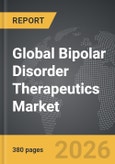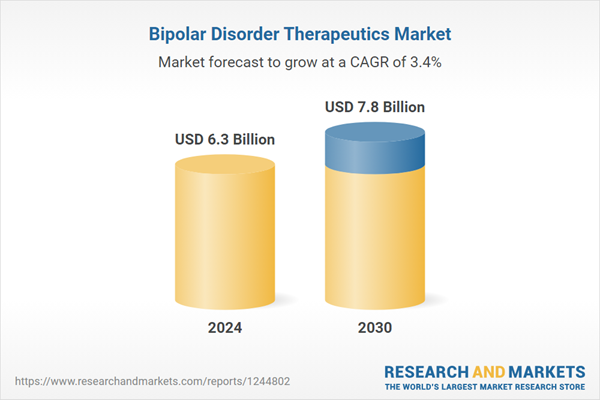Global Bipolar Disorder Therapeutics Market - Key Trends & Drivers Summarized
Bipolar disorder, a chronic mental health condition characterized by extreme mood swings including manic highs and depressive lows, requires comprehensive therapeutic strategies to manage symptoms and improve quality of life. The primary therapeutic approaches for bipolar disorder involve pharmacological treatments, psychotherapy, and lifestyle modifications. Medications are the cornerstone of bipolar disorder management, with mood stabilizers such as lithium, anticonvulsants like valproate and lamotrigine, and atypical antipsychotics like quetiapine and aripiprazole being commonly prescribed. These medications help to stabilize mood, prevent relapse, and reduce the severity of manic and depressive episodes. In addition to pharmacotherapy, psychotherapeutic interventions such as cognitive-behavioral therapy (CBT), psychoeducation, and family therapy are essential in helping patients understand their condition, develop coping strategies, and maintain treatment adherence.The development and optimization of bipolar disorder therapeutics have been significantly influenced by ongoing research and clinical trials. Advances in neuroscience and a better understanding of the pathophysiology of bipolar disorder have led to the development of more targeted treatments. For instance, research into the role of neurotransmitters and neuroplasticity in bipolar disorder has paved the way for novel pharmacological agents aimed at specific neural pathways. Additionally, the integration of digital health technologies, such as mobile apps and telepsychiatry, has enhanced the delivery of psychotherapy and monitoring of treatment adherence. These technologies provide patients with more accessible and flexible therapeutic options, facilitating continuous care and real-time monitoring of symptoms, which are crucial for managing a condition characterized by episodic fluctuations.
The growth in the bipolar disorder therapeutics market is driven by several factors, including the rising prevalence of the disorder and the increasing awareness and diagnosis of mental health conditions. As mental health stigma decreases and more people seek treatment, the demand for effective bipolar disorder therapies has surged. Technological advancements in drug delivery systems and the development of long-acting injectable medications have improved patient compliance and outcomes. Furthermore, significant investment in research and development by pharmaceutical companies is leading to the introduction of innovative therapies that offer better efficacy and safety profiles. The expansion of telehealth services has also played a critical role, especially in the context of the COVID-19 pandemic, by providing remote access to mental health care. Additionally, government initiatives and policies aimed at improving mental health infrastructure and funding are supporting market growth. The growing emphasis on personalized medicine, where treatments are tailored to the individual's genetic and biomarker profiles, is expected to further drive advancements in bipolar disorder therapeutics.
Report Scope
The report analyzes the Bipolar Disorder Therapeutics market, presented in terms of market value (USD). The analysis covers the key segments and geographic regions outlined below.- Segments: Drug Class (Antipsychotic Drugs, Anticonvulsants, Mood Stabilizers, Antidepressant Drugs, Anti-Anxiety Drugs).
- Geographic Regions/Countries: World; USA; Canada; Japan; China; Europe; France; Germany; Italy; UK; Spain; Russia; Rest of Europe; Asia-Pacific; Australia; India; South Korea; Rest of Asia-Pacific; Latin America; Argentina; Brazil; Mexico; Rest of Latin America; Middle East; Iran; Israel; Saudi Arabia; UAE; Rest of Middle East; Africa.
Key Insights:
- Market Growth: Understand the significant growth trajectory of the Antipsychotic Drugs segment, which is expected to reach US$3.5 Billion by 2030 with a CAGR of 3.3%. The Anticonvulsants segment is also set to grow at 4.3% CAGR over the analysis period.
- Regional Analysis: Gain insights into the U.S. market, valued at $2.8 Billion in 2024, and China, forecasted to grow at an impressive 5.5% CAGR to reach $637 Million by 2030. Discover growth trends in other key regions, including Japan, Canada, Germany, and the Asia-Pacific.
Why You Should Buy This Report:
- Detailed Market Analysis: Access a thorough analysis of the Global Bipolar Disorder Therapeutics Market, covering all major geographic regions and market segments.
- Competitive Insights: Get an overview of the competitive landscape, including the market presence of major players across different geographies.
- Future Trends and Drivers: Understand the key trends and drivers shaping the future of the Global Bipolar Disorder Therapeutics Market.
- Actionable Insights: Benefit from actionable insights that can help you identify new revenue opportunities and make strategic business decisions.
Key Questions Answered:
- How is the Global Bipolar Disorder Therapeutics Market expected to evolve by 2030?
- What are the main drivers and restraints affecting the market?
- Which market segments will grow the most over the forecast period?
- How will market shares for different regions and segments change by 2030?
- Who are the leading players in the market, and what are their prospects?
Report Features:
- Comprehensive Market Data: Independent analysis of annual sales and market forecasts in US$ Million from 2024 to 2030.
- In-Depth Regional Analysis: Detailed insights into key markets, including the U.S., China, Japan, Canada, Europe, Asia-Pacific, Latin America, Middle East, and Africa.
- Company Profiles: Coverage of players such as Astellas Pharma, Inc., Aurobindo Pharma Ltd., Aphios Corporation, Bionomics Ltd., AbbVie, Inc. and more.
- Complimentary Updates: Receive free report updates for one year to keep you informed of the latest market developments.
Some of the 102 companies featured in this Bipolar Disorder Therapeutics market report include:
- Astellas Pharma, Inc.
- Aurobindo Pharma Ltd.
- Aphios Corporation
- Bionomics Ltd.
- AbbVie, Inc.
- Amneal Pharmaceuticals, Inc.
- Alexza Pharmaceuticals
- Alkermes PLC
- Avineuro Pharmaceuticals, Inc.
- Azevan Pharmaceuticals, Inc.
- Alembic Pharmaceuticals Limited
- Alfresa Pharma Corporation
- Bentley & Remington (P) Ltd.
- Actiza Pharmaceutical Pvt., Ltd.
- Acadia Pharmaceuticals, Inc.
This edition integrates the latest global trade and economic shifts into comprehensive market analysis. Key updates include:
- Tariff and Trade Impact: Insights into global tariff negotiations across 180+ countries, with analysis of supply chain turbulence, sourcing disruptions, and geographic realignment. Special focus on 2025 as a pivotal year for trade tensions, including updated perspectives on the Trump-era tariffs.
- Adjusted Forecasts and Analytics: Revised global and regional market forecasts through 2030, incorporating tariff effects, economic uncertainty, and structural changes in globalization. Includes historical analysis from 2015 to 2023.
- Strategic Market Dynamics: Evaluation of revised market prospects, regional outlooks, and key economic indicators such as population and urbanization trends.
- Innovation & Technology Trends: Latest developments in product and process innovation, emerging technologies, and key industry drivers shaping the competitive landscape.
- Competitive Intelligence: Updated global market share estimates for 2025, competitive positioning of major players (Strong/Active/Niche/Trivial), and refined focus on leading global brands and core players.
- Expert Insight & Commentary: Strategic analysis from economists, trade experts, and domain specialists to contextualize market shifts and identify emerging opportunities.
Table of Contents
Companies Mentioned (Partial List)
A selection of companies mentioned in this report includes, but is not limited to:
- Astellas Pharma, Inc.
- Aurobindo Pharma Ltd.
- Aphios Corporation
- Bionomics Ltd.
- AbbVie, Inc.
- Amneal Pharmaceuticals, Inc.
- Alexza Pharmaceuticals
- Alkermes PLC
- Avineuro Pharmaceuticals, Inc.
- Azevan Pharmaceuticals, Inc.
- Alembic Pharmaceuticals Limited
- Alfresa Pharma Corporation
- Bentley & Remington (P) Ltd.
- Actiza Pharmaceutical Pvt., Ltd.
- Acadia Pharmaceuticals, Inc.
Table Information
| Report Attribute | Details |
|---|---|
| No. of Pages | 380 |
| Published | February 2026 |
| Forecast Period | 2024 - 2030 |
| Estimated Market Value ( USD | $ 6.3 Billion |
| Forecasted Market Value ( USD | $ 7.8 Billion |
| Compound Annual Growth Rate | 3.4% |
| Regions Covered | Global |









